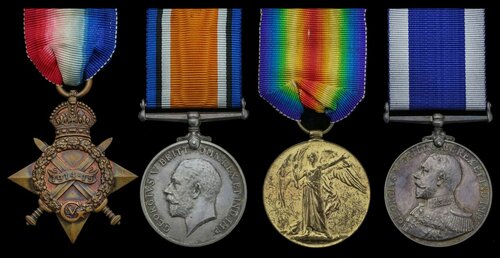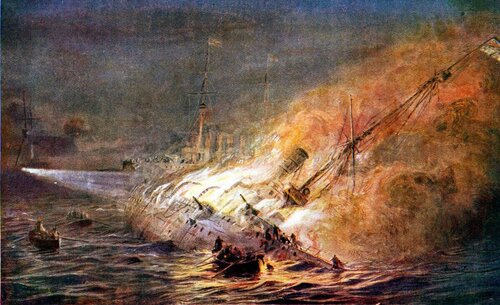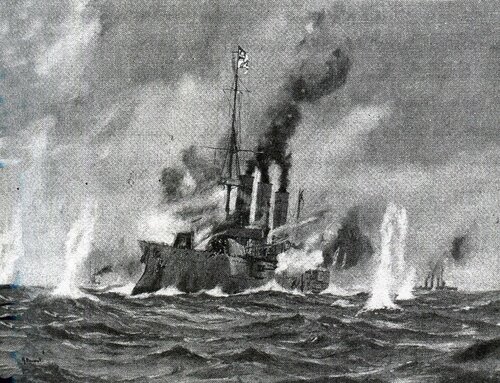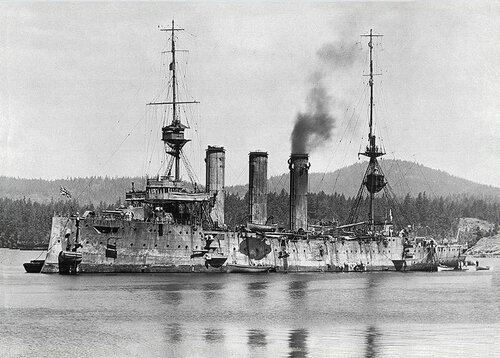Auction: 21103 - Orders, Decorations and Medals e-Auction 4
Lot: 254
Four: Chief Ship's Cook, J. H. Hallum, Royal Navy, who served during the Battle of the Falkland Islands and during the blockade of the Konigsbergon the Rufiji River
1914-15 Star (343306, J. H. Hallum, Ch. Sh. Ck., R.N.); British War and Victory Medals (343306 J. H. Hallum. Ch. Sh. Ck. R. N.); Naval L.S. & G.C., G.V.R (343306. J. H. Hallum, Ch. Sh. Ck. H.M.S. Cornwall.), overall good very fine (4)
John Henry Hallum was born at Portsmouth on 11 December 1881 and worked as an engine cleaner prior to enlistment. Having enlisted on 8 March 1900 with the rank of Cooks Mate Class II, soon promoted on 8 September to Cooks Mate while serving aboard H.M.S. Hyacinth. After a period ashore at H.M.S. Vivid I he spent time aboard several vessels including H.M.S. Brilliant and Trafalgar. Later while aboard H.M.S. Cornwallis he was promoted 2nd Ship's Cook on 1 November 1906. and further advanced Acting Ship's Cook on 1 May 1910 while with H.M.S. Kent. Confirmed in the rank on 1 April 1912 while ashore before taking up service with H.M.S. Cornwall, the vessel with which he was to pass much of the Great War. Attached to 4th Cruiser Squadron she headed for South America to join the fleet of Vice-Admiral Craddock hunting the German East Asia Squadron off Chile.
Fortunately for Cornwall she was detached from Vice-Admiral Craddock's doomed force before the Battle of Coronel. As a result of this good luck she was at Port Stanley with the rest of Admiral Sturdee's fleet when the German East Asia Squadron moved in to try and secure the refuelling station. Von Spee's Squadron had been lucky to get as far as they had but now their luck ran out as rather than an undefended target they found the very fleet assigned to hunt them down. Even then the battle could have gone very differently as the British ships needed time to reassemble their crews and raise steam. Fortunately the German scouts took fright at the fire from the guardship H.M.S. Canopus. Cornwall took station with H.M.S. Carnarvon and after a chase lasting most of the afternoon opened fire on S.M.S. Leipzig at 4:17 p.m., the ship's logs note the range as 10,500 yards. Being fast enough to catch Leipzig, Cornwall joined Glasgow in pursuit of her and a heavy, running engagement developed. Poor weather drew the conclusion out but it was hardly in doubt, with the range reduced to 8,000 yards lyddite shells were fired causing fires all over the already limping Leipzig. Still the Leipzig fought on until 7:16 p.m. after waiting for half an hour the two British vessels gave her another volley to ensure she was disabled, for despite being almost totally ablaze she hadn't struck her colours, and observed the situation. At around 9:00 p.m. they lowered boats to pick up survivors, of which there were terribly few, the Cornwall taking up only one Officer and four other ranks with four Officers and thirteen other ranks saved overall. By 9:23 p.m. the Leipzig foundered at sank, Cornwall had been hit 18 times during the intense firefight but despite this she didn't lose a man.
Having refitted the Cornwall sailed south and on 27 April joined the blockade of the S.M.S. Königsberg in the Rufiji River. After several weeks she head north to Gallipoli on 10 May before sailing east and arriving in Singapore on 17 April 1916. The vessel remained in Singapore for some time refitting before sailing to the East Indies, however Hallum was not aboard her having transferred to H.M.S. Diana with which he served until 27 September 1917, later transferring to the shore establishment H.M.S. Vivid I. He remained here for the rest of the war until 10 February 1919, whereupon he was transferred to H.M.S. New Zealand where he was promoted Chief Petty Officer Cook on 17 May. Hallum was shore pensioned on 15 March 1922.
Subject to 20% VAT on Buyer’s Premium. For more information please view Terms and Conditions for Buyers.
Sold for
£290
Starting price
£110











